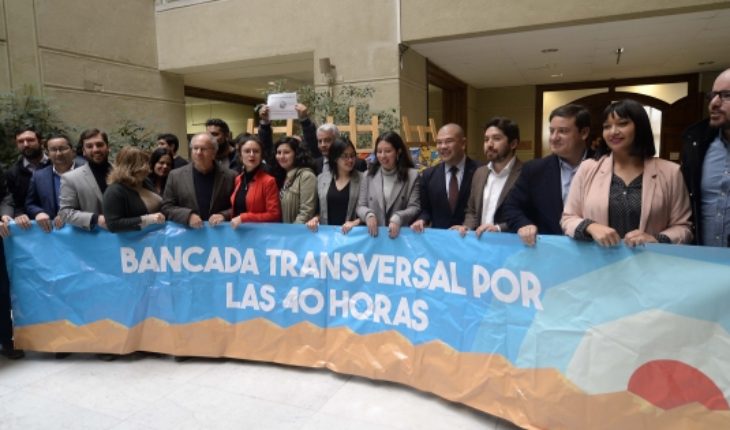From the opposition they reacted with annoyance following the recommendation of the Executive’s technical board that suggested suspending the project processing that seeks to reduce the working day from 45 to 40 hours per week, following the social outburst situation in the country.
The 42-page report – which was delivered this weekend to President Sebastián Piñera – argues that “given the country’s delicate economic context and its projections of growth and unemployment for the coming quarters,” most members recommends that the passage of the bill in the Senate be temporarily suspended after approval in the Chamber of Deputies.
“International experience suggests that reductions in working hours in high unemployment tend to lead to low employment of people with consequent loss of income. This is also important from a career of people’s quality of life and mental health, as an important determinant is precisely the opportunities to have employment,” the paper adds.
The technical table responsible for analyzing the reduction of the working day is made up of economists Andrea Repetto, Rodrigo Valdés, Rodrigo Vergara, Vittorio Corbo and José de Gregorio; lawyers Carmen Domínguez, Marcelo Albornoz, Osvaldo Andrade and Carlos Boada. The Undersecretary of Labour, Fernando Arab, was the technical secretary of the instance.
“They’re looking for excuses”
For communist MEP Camila Vallejo, the expert team’s argument “doesn’t surprise us,” noting that by appealing to the economic context “we couldn’t move forward” on any such project.
“What has happened when working hours are reduced in the countries where it has been done is to generate more employment because what happens is that new workspaces are opened,” he said.
Vallejo insisted that “the excuse of the economic context is always used to not advance fundamental social rights and we are again wanted to impose that, but it is a failed argument. Already people understand that improving economic progress requires work dignity, good working conditions are required.”
For her part, MEP Karol Cariola argued that since the Government “are looking for excuses not to respond to the public in relation to their demands”, adding that “it is very regrettable that a group of experts re-examines the need to delay a discussion which is precisely one of the demands that citizenship has raised. When we left with this debate it was exactly the same argument.”
In this context, Vallejo called on the senators that it is “imperative” that the project be discussed, responding to the “mandate for us congressmen who is establishing it the people as a whole, which is the demand for dignity and context economic economy cannot again be an excuse not to move forward.”
From the Senate, DC bank chief Yasna Provoste said she hopes the bill will “soon be Republic Law” and added that it is in Parliament that the initiative should be discussed, not in a “closed room.”
“Those who have an opinion and have expressed it, as the panel of experts, should put it to parliament, to the Senate, where sessions are public, televised and people can listen to the arguments and the basics,” he said.
According to the parliamentarian, “the Senate has already received the project that seeks to legislate regarding the 40 hours for workers in our country. And it is in the Senate that we hope to refine this legislative rule. Moreover, the chair of the Labour Committee has already arranged a hearing process to listen to different experts.”
In addition, Provoste said that they hope that “the concern that the Executive has expressed about unemployment will start by looking at its own actions, because today this government is the one that has generated a set of arbitrary unemployment, rather persecutions, officials who have had their contract renewals for more than a decade.”
Similarly, representative DC asked the Government for “consistency.” And if they’re worried about the job. Don’t themselves be the main cause of unemployment of civil servants in this country.”
Gradually
However, the cross-cutting group considers within its recommendations to reduce the working hours to 40 hours gradually, so that the world of work can adapt to the new day, taking the negative effects that this could bring, such as a job drop and Wages.
Most of the table members are in favour of this graduality being implemented within five years without distinguishing the size of the companies, for which two formulas are proposed: a staggered graduality in which the average 45 to 42 weekly hours is lowered from the third year, and from 42 to 40 from the fifth year. The other option is to do so without staggering, reducing working hours five years after the entry into force of the new law.
Another proposal has to do with limiting the length of the working day, that it does not exceed 10 hours per day and that they are worked at most, 6 days a week.
As for the right time to start implementing a reduction in the day, the group’s opinions are divided. Some believe that a government body involving workers’ and business organizations “that analyses the economic and social conditions that need to be considered for effective implementation” is necessary. Others rather choose to have an analysis of certain parameters, such as the unemployment and growth rate that will allow us to start the process of reducing the day.
translated from Spanish: New “40-hours” clash: stinging opposition against government’s technical board recommendation to suspend project
December 16, 2019 |





